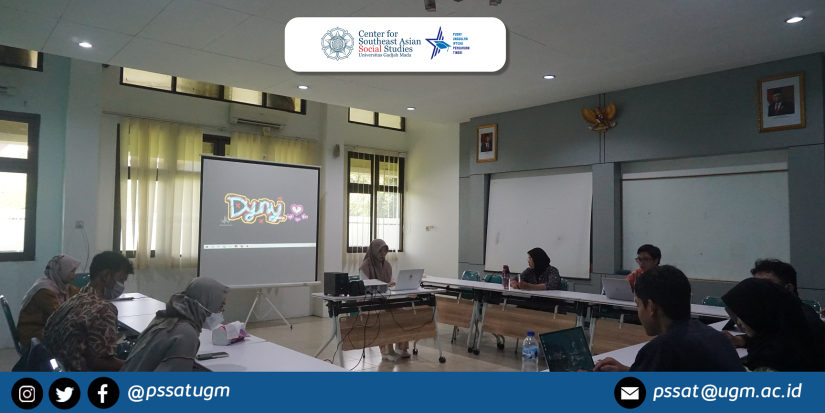
On Monday (6/3/2023), an intern named Dyny Wahyu Seputri, who is pursuing a Master’s degree in American Studies at Gadjah Mada University, presented her thesis research entitled “Towards a Transnational View: Pencak Silat in the United States of America” in a forum at the PSSAT office. The forum was the 39th Seachat, which is one of the internal activities at PSSAT. The speaker presented her ideas on the direction of the development of Pencak Silat martial arts in the United States.
First, the speaker opened the discussion by discussing the meaning of transnationalism in the context of American Studies. Transnationalism can refer to many aspects, such as economics, politics, literature, and socio-culture. In this case, Pencak Silat falls into the socio-cultural aspect because it is an Indonesian tradition that has been adopted and developed in the United States. In this case, the values of Pencak Silat are adopted and developed there as education and so on.
Second, the speaker explained the history of Pencak Silat, which is believed to have emerged in the 7th or 9th century AD with the discovery of relief evidence at the Prambanan Temple in Yogyakarta. Then, in 1980, Pencak Silat was first introduced to America through the Al-Azhar school located in Virginia. From there, the Virginia Silat Institute was established, which oversees several silat styles in America such as Merpati Putih, Tapak Suci, Silek Harimau, Cimande, and others. In the Silat Institute, not only silat practitioners can participate in competitions, but beginners can also participate.
Third, the speaker showed that the development of Pencak Silat in America has several cultural assimilations in terms of language, namely using the Indonesian language for its demonstration of movements, and the silat teacher also tries to incorporate spiritual elements, by inviting students to have meals together and even performing terawih prayers.
Finally, the speaker presented her opinion on the pros and cons of the development of Pencak Silat in America. From the positive side, Pencak Silat allows for cross-cultural development, not only in terms of martial arts but also language, culture, traditions, and others. In addition, Pencak Silat can also improve friendship between the two countries, Indonesia and America, and also has the potential to become a global consumption, meaning it is widely consumed through art performances or movies, making it more well-known by the global community.
From the negative side, Pencak Silat may experience Americanization, blending with American culture (melting pot) so that there is a possibility of aspects of its history or philosophical values not being conveyed. In addition, if Pencak Silat is consumed globally, there is a potential weakness in border control so that Indonesia cannot fully control it. If it is not controlled, Pencak Silat could be further developed by foreigners.
The forum continued with a discussion of the possibility of transnational negativity and the development of Pencak Silat on the international scene.
by: Ganggas Prakosa Sigit Wibowo
